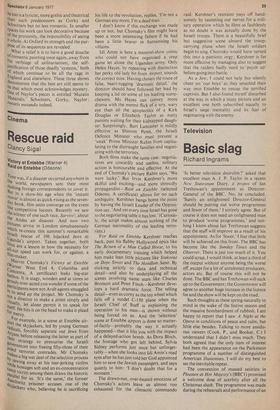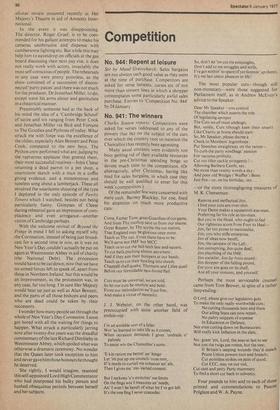Television
Basic slag
Richard Ingrams
'Is better television desirable?' asked that excellent man A. J. P. Taylor in a recent New Statesman Diary, a propos of Ian Trethov■an's appointment as DirectorGeneral of the BBC. No, he concluded. 'Surely an enlightened Director-General should be putting out worse programmes and fewer of them.' I entirely agree. But of course it does not need an enlightened man to produce 'worse programmes,' and nothing I know about Ian Trethowan suggests that the stuff will improve as a result of his appointment. As for 'fewer,' I fear that little will be achieved on this front. The BBC has become like the Sunday Times and the Observer. There is just too much of' it. You could scrap, I would think, at least a third of the output without anyone being the worse off, except for a lot of untalented producers, actors etc. But of' course this will not be done. The BBC and Ian Trethowan will suck up to the Government; the Government will agree to another huge increase in the licence fee and the show will be kept on the road. Such thoughts as these spring naturally to mind in the wake of the festive season and the massive bombardment of' rubbish. I am happy to report that I saw A Night at the Opera in conditions of peace and calm, but little else besides. Talking to more assiduous viewers (Cook, P., and Booker, C.) I understand that I didn't miss much. They both agreed that the only item of interest had been the appearance on the Parkinson programme of a number of distinguished American illusionists. I will do my best to see the inevitable repeat. The convention of massed satirists in Pleasure at Her Majesty's (BBC]) promised a welcome dose of acerbity after all the Christmas slush. The programme was made during the rehearsals and performance of an
all-star review mounted recently at Her Majesty's Theatre in aid of Amnesty International.
In the event it was disappointing. The director. Roger Graef, is to be commended for his gallant attempts to make his cameras unobtrusive and dispense with cumbersome lighting etc. But while this may help him to eavesdrop on officials at the gas board discussing their next pay rise, it does not really work with actors, invariably the most self-conscious of people. The rehearsals in any case were pretty pointless, as the show consisted of a succession of disconnected 'party pieces' and there was not much for the producer, Dr Jonathan Miller, to do, except wave his arms about and gesticulate in a theatrical manner.
Presumably someone had at the back of his mind the idea of a 'Cambridge School' of satire and wit ranging from Peter Cook and Jonathan Miller via Bird and Fortune to The Goodies and Pythons of today. What struck me with force was the excellence of the oldies, especially Alan Bennett and Peter Cook, compared to the new boys. The Python crew performed what are, judging by the rapturous applause that greeted them, their most successful routines—John Cleese teturning a dead parrot to a pet shop, a courtroom sketch with a man in a coffin giving evidence, and a monotonous and tuneless song about a lumberjack. These all involved the wearisome shouting of the type I deplored in the only episode of FawIty Towers which I watched, besides not being particularly funny. Glimpses of Cleese during rehearsal gave an impression of complacency and even arrogance—another victim of Cambridge perhaps.
With the welcome revival of Beyond the Fringe in mind I fell to asking myself why the Coronation, instead of being just broadcast for a second time in toto, as it was on New Year's Day,couldn't actually be put on again at Westminster Abbey in aid of charity (the National Debt). The procession would have to be cut down, now that we have no armed forces left to speak of, apart from those in Northern Ireland, but this would be an improvement, as the procession was, in any case, far too long. I'm sure Her Majesty would bear up just as well as Alan Bennett, and the parts of all those bishops and peers who are dead could be taken by their successors.



































 Previous page
Previous page